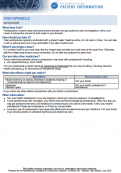Here are some things to know when you're taking pantoprazole. Other things may be important as well, so ask your healthcare provider what you should know about.
Avoid long-term use of pantoprazole
If you don’t need it, pantoprazole shouldn't be taken long term because of the possible side effects. There may be a small increased risk of bone fractures, chest infection, gut infection and nutrient deficiencies such as low magnesium and vitamin B12.
If you’ve been taking a PPI for reflux for longer than 4 to 8 weeks, and your symptoms seem to be well managed, it’s a good idea to talk to your healthcare provider about reviewing your medicine. They may recommend reducing your treatment. This could include:
- Reducing your daily dose of pantoprazole.
- Taking pantoprazole only when you experience the symptoms of heartburn and reflux (also known as on-demand therapy).
- Stopping treatment completely, as your symptoms may not return. It may be best to reduce the dose over a few weeks before stopping.
Read more about PPIs for heartburn and reflux.(external link)
Taking other medicines
Pantoprazole may be affected by medicines or herbal supplements, so check with your doctor or pharmacist before starting any new medicines.
Having an endoscopy
Ask your doctor if you should stop taking pantoprazole a few weeks before your endoscopy. It may hide some of the problems that would usually be spotted during an endoscopy.









